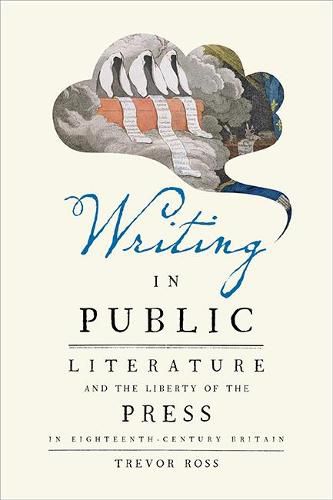Readings Newsletter
Become a Readings Member to make your shopping experience even easier.
Sign in or sign up for free!
You’re not far away from qualifying for FREE standard shipping within Australia
You’ve qualified for FREE standard shipping within Australia
The cart is loading…






What is the role of literary writing in democratic society?
Building upon his previous work on the emergence of literature, Trevor Ross offers a history of how the public function of literature changed as a result of developing press freedoms during the period from 1760 to 1810. Writing in Public examines the laws of copyright, defamation, and seditious libel to show what happened to literary writing once certain forms of discourse came to be perceived as public and entitled to freedom from state or private control.
Ross argues that-with liberty of expression becoming entrenched as a national value-the legal constraints on speech had to be reconceived, becoming less a set of prohibitions on its content than an arrangement for managing the public sphere. The public was free to speak on any subject, but its speech, jurists believed, had to follow certain ground rules, as formalized in laws aimed at limiting private ownership of culturally significant works, maintaining civility in public discourse, and safeguarding public deliberation from the coercions of propaganda. For speech to be truly free, however, there had to be an enabling exception to the rules.
Since the late eighteenth century, Ross suggests, the role of this exception has been performed by the idea of literature. Literature is valued as the form of expression that, in allowing us to say anything and in any form, attests to our liberty. Yet, paradoxically, it is only by occupying no definable place within the public sphere that literature can remain as indeterminate as the public whose self-reinvention it serves.
$9.00 standard shipping within Australia
FREE standard shipping within Australia for orders over $100.00
Express & International shipping calculated at checkout
What is the role of literary writing in democratic society?
Building upon his previous work on the emergence of literature, Trevor Ross offers a history of how the public function of literature changed as a result of developing press freedoms during the period from 1760 to 1810. Writing in Public examines the laws of copyright, defamation, and seditious libel to show what happened to literary writing once certain forms of discourse came to be perceived as public and entitled to freedom from state or private control.
Ross argues that-with liberty of expression becoming entrenched as a national value-the legal constraints on speech had to be reconceived, becoming less a set of prohibitions on its content than an arrangement for managing the public sphere. The public was free to speak on any subject, but its speech, jurists believed, had to follow certain ground rules, as formalized in laws aimed at limiting private ownership of culturally significant works, maintaining civility in public discourse, and safeguarding public deliberation from the coercions of propaganda. For speech to be truly free, however, there had to be an enabling exception to the rules.
Since the late eighteenth century, Ross suggests, the role of this exception has been performed by the idea of literature. Literature is valued as the form of expression that, in allowing us to say anything and in any form, attests to our liberty. Yet, paradoxically, it is only by occupying no definable place within the public sphere that literature can remain as indeterminate as the public whose self-reinvention it serves.